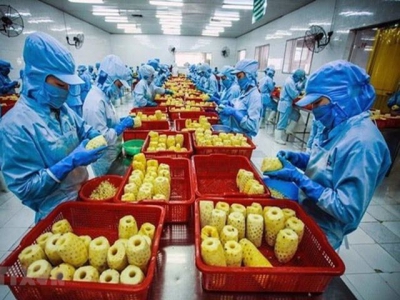Fruit, vegetable exports fall 5.8 percent in eight months

Hanoi – Fruit and vegetable exports in the first eight months of this year fell by 5.8 percent year on year to about 2.53 billion USD, according to the Agro Processing and Market Development Department (Agrotrade) under the Ministry of Agriculture and Rural Development.
Workers process pineapples for export at the factory of the An Giang Fruit-Vegetables and Foodstuff JSC in the southern province of An Giang (Photo: VNA)
The figure includes 246 million USD in August.
Between January and July, China remained the biggest importer as it accounted for 70.5 percent of Vietnam’s fruit and vegetable exports, equivalent to 1.65 billion USD – down 5.6 percent year on year.
It was followed by the US, whose imports rose 12.5 percent to 84.07 million USD, making up 3.6 percent of the total. The Republic of Korea ranked third with 76.91 million USD worth of the commodities from Vietnam, rising 13.1 percent and accounting for 3.3 percent of the total.
The markets posting surges in the import of Vietnamese fruits and vegetables included Laos 2.84 times, Hong Kong (China) 2.37 times, Taiwan (China) 44 percent, and the Netherlands 37.9 percent.
Also in August, Vietnam purchased 134 million USD worth of fruits and vegetables from other countries, raising the eight-month imports to 1.28 billion USD, up 11.5 percent from a year earlier.
Agrotrade forecast there remain numerous difficulties facing the exports for the remaining months of this year due to uncertainties in the world’s economy, the escalating US-China trade tension that will cause reluctance over trade and investment activities, and the enhanced application of strict food safety and environmental protection standards in many markets.
Related news
 Luc Ngan focuses on intensive citrus cultivation toward export
Luc Ngan focuses on intensive citrus cultivation toward export The local authority is now instructing the farmers to increase the intensive farming areas under a clean procedure, restructure the varieties
 Organic farmers to harvest record acres
Organic farmers to harvest record acres Organic commodity farmers will harvest a record number of acres across the U.S. this year despite the weather and trade challenges plaguing agriculture.
 Door open wide for farm produce export to Europe
Door open wide for farm produce export to Europe The recent signing of the EU-Vietnam Free Trade Agreement (EVFTA), which is expected to take effect from early 2020, has opened the door wider for Vietnamese